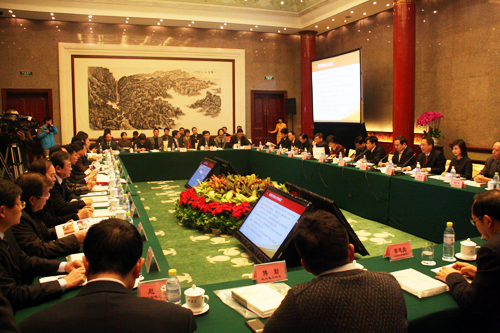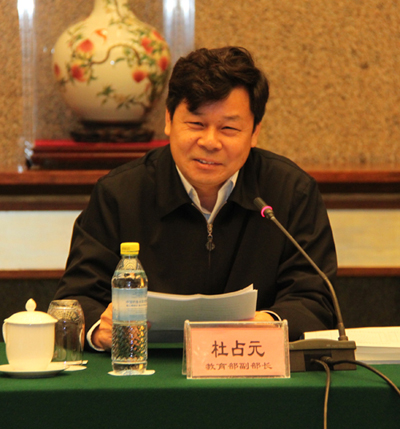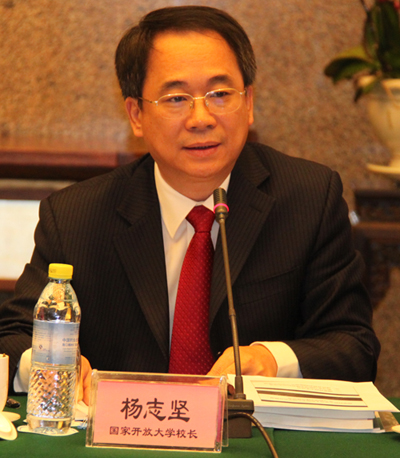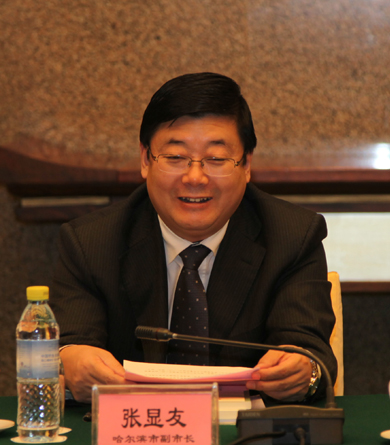
On December 13, 2012, a conference was held in Beijing to promote cooperation between the Open University of China (OUC) and 15 major cities in the joint development of learning-oriented cities. The 15 cities represented at the conference were: Shenyang, Dalian, Changchun, Harbin, Nanjing, Hangzhou, Ningbo, Xiamen,
Jinan, Qingdao, Wuhan, Guangzhou, Shenzhen, Chengdu, and Xi’an. Du Zhanyuan, Vice Minister of Education, attended the conference and delivered an important speech. After the conference, an agreement was signed to officially establish a supportive and cooperative alliance between the OUC and these cities for the promotion of learning-oriented cities.


Du Zhanyuan, Vice Minister of Education
Du Zhanyuan noted that the convening of the OUC and 15 major cities to promote the development of learning-oriented cities was of great significance. It was a concrete action to jointly learn and implement the agenda of the 18th National Congress of the CPC. The goal of the conference was to organically integrate construction of the OUC and construction of a learning-oriented society, promote the development of learning-oriented cities, and stimulate further development of the OUC.
According to Du Zhanyuan, the OUC is a new type of university that differs from conventional universities and colleges in the following three aspects: 1. Mission. One of the OUC’s most important missions is to promote the development of a lifelong learning system and the formation of a learning-oriented society. In that sense, the OUC is a product of the times. 2. Technology. As an important vehicle and form of open, flexible, and lifelong learning, the OUC is the iconic product of the integration of modern information technology and open education. The OUC is a strong force in leading the digitization and modernization of education in China. 3. Target Population. The OUC supports degree education and non-degree education in a balanced way in order to provide education opportunities and services to anyone who has the desire and the ability to learn. The university ensures education rights, expands education opportunities, and promotes education equality.
Du Zhanyuan stressed that the newly established alliance was an organizational innovation and an important means to promote the formation of various learning organizations at all levels. The OUC can work with these cities and fully utilize their quality educational resources to jointly boost degree education and non-degree continuing education, such as community education, vocational education, senior education, and education relating to leisure, culture and hobbies. This alliance will contribute to the sharing of resources and complementary advantages as part of a win-win development model that meets the demand for learning-oriented cities and satisfies the demands of urban residents for personalized, diversified learning.
Du Zhanyuan hopes that the OUC can seize this great opportunity and use this alliance as a powerful platform and stage to further strengthen qualitative development, continuously upgrade educational capacities, optimize services, innovate systems and mechanisms, and actively explore joint development and in-depth collaboration with these cities. Only in this way can the OUC become a university available to all and make new, bigger contributions to the economic and social development of the 15 major cities, to the development of learning-oriented cities, and to the formation of a learning-oriented society.

Yang Zhijian, president of the OUC
Yang Zhijian, president of the OUC, introduced the state of the establishment of the OUC and initiatives to promote the development of learning-oriented cities. He reported that the OUC had performed the following tasks in participating in the development of learning-oriented cities: 1. Undertook the construction of a public service platform for lifelong learning with the help of RTVUs at the 15 major cities, at the direction of the Ministry of Education and Ministry of Finance; 2. Regional RTVUs and local government departments worked closely to set up an online learning platform for cadre education in 13 provinces and municipalities, providing a feasible path to construct an operating mechanism for resource sharing and exploring a new way to train cadres online. 3. The Ministry of Education Community Education Research and Training Center was established at the OUC in 2010 and continues to innovate models of community education. The center helped establish 45 experimental community education centers nationwide, launched the “i-Experiment” cloud platform and held various theme events. Community music events were broadcast nationwide for the past three consecutive years. 4. Established the OUC Digital Learning Resources Centre, which through construction, repackaging, integration, purchase, exchange and collaboration, amasses a huge amount of high-quality education resources and offers these to the public through various methods. 5. Explored new ways to share digital learning resources and develop learning terminals of all sorts, including PCs, mobile phones, tablets and Internet TV.
On how to work with the 15 major cities to promote the development of learning-oriented cities, Yang Zhijian explained the alliance’s purpose, mission and collaborative vision. He said that according to the Strategic Plan for the Open University of China, the OUC must rely on the support and involvement of all social forces to constantly improve educational capacities. With the assistance of the Ministry of Education, the OUC will continue to establish other alliances. This supportive and cooperative alliance with 15 major cities takes advantage of each member's resources and strengths to promote the development of learning-oriented cities through various training programmes, community education and citizen quality education. The alliance will greatly expand such education with the support of local governments and the OUC’s educational resources, teaching network and public service platform, meeting city residents' demands for diversified, personalized learning.

Zhang Xianyou, vice mayor of Harbin

Wang Guangzheng, vice mayor of Qingdao and member of Qingdao Standing Committee
On behalf of the 15 major cities, Zhang Xianyou, vice mayor of Harbin, and Wang Guangzheng, vice mayor of Qingdao and member of Qingdao Standing Committee, delivered speeches describing their respective cities' development as learning-oriented cities. They expressed their willingness to cooperate fully with the OUC to construct a learning-oriented society in which every citizen is committed to learning and pursues lifelong learning.
More than 60 people attended the conference, among whom were Zhu Chengqing, vice mayor of Dalian; Liu Yingzi, vice mayor of Wuhan; Fu Yonglin, vice mayor of Chengdu; Yang Guangxin, vice mayor of Xi’an; Wang Xinwen, vice mayor of Jinan; Zhang Lianshui, general secretary of the Hangzhou municipal government; Xu Xingjia, deputy secretary of the Shenyang municipal government; Chen Shaokang, deputy secretary of the Guangzhou municipal government; leaders of education departments in the major cities; Ruan Zhiyong, secretary of the OUC Party Committee; Deputy Secretary Zhang Shaogang; and leaders from RTVUs in the 15 major cities.
By Wen Shuyu, He Jing, the OUC